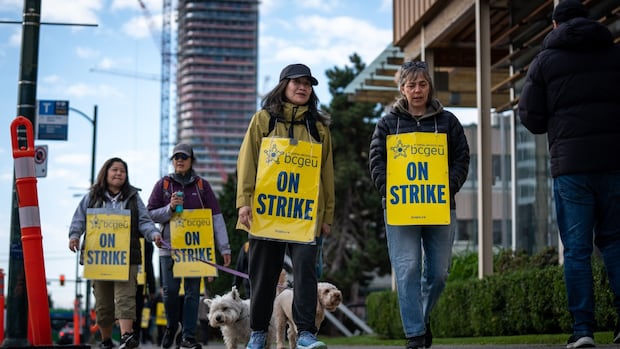British ColumbiaSix weeks into a labour dispute that has seen 22,000 B.C. public service workers involved in a full or partial strike, people across the province are feeling the impact of service delays and disruptions — from social services and the justice system, to university campuses and liquor stores.Province seeing ‘slowdowns’ due to strike, finance minister says, as services affected by job actionEmily Fagan · CBC News · Posted: Oct 08, 2025 8:00 AM EDT | Last Updated: 7 hours agoBCGEU employees are pictured on strike outside of a B.C. Liquor Store in Vancouver on Friday, Oct. 3, 2025. (Ben Nelms/CBC)Six weeks into labour action that has seen 22,000 public service workers taking part in a full or partial strike from the jobs that keep provincial services functioning, people across the province are feeling the impact of service delays and disruptions.This toll is being felt across sectors — from social services and the justice system, to university campuses and liquor stores.With no end in sight for the current labour action, B.C. General Employees’ Union (BCGEU) president Paul Finch says this disruption is inevitable, with the majority of the union’s 34,000 members on strike.”There’s an incredible number of important duties that BCGEU and [Professional Employees Association] members play — whether that’s bridge construction, engineering safety across the province, some of the meteorological reports, all of the mining and permit approvals necessary to keep our province going and the safety regulations there,” said Finch. “The list is quite expansive.”The BCGEU president said liquor and cannabis distribution is also facing significant delays.Negotiations have stalled since Sept. 29. That’s when the province presented a contact that offered little change from its previous offer, according to Finch.BCGEU president Paul Finch pickets outside an ICBC driver licensing office in Surrey, B.C., on Monday, Sept. 8, 2025. (Ben Nelms/CBC)The union is fighting for a four per cent per year general wage increase. The province has said publicly it has offered a five per cent increase over two years — though the BCGEU disputes this figure, saying it is not a general wage increase and includes market adjustments along with other items.”There’s no question that there is an impact from these valued government workers not being at work, and we are seeing some slowdowns in some areas,” said Finance Minister Brenda Bailey, who declined to provide examples of where these effects are being seen.”So we’re deeply focused on getting back to the table.”Bailey says the province has not calculated the savings it has retained in the six weeks since the strike began, and noted the labour action has come at a cost to the province, as well, through the loss of sales through B.C. Liquor.Indefinite delays, justice system backlogsKyla Lee, a lawyer based in Vancouver who deals with driving offences and prohibitions, says she’s seeing hearings adjourned indefinitely due to adjudicators being on strike.It’s left people with driving prohibitions waiting on hearings, decisions or even to hear the case against them — all while being unable to drive for an unknown amount of time.Lee worries about the impact this is having on individuals’ right to a timely, fair hearing — and the backlog it may cause, even after the strike ends.”It’s going to make it very difficult for adjudicators, when they’re back to work, to render decisions in a timely fashion, because they’re going to have a ton of hearings to catch up on, and that’s going to overload them,” she said.B.C. Finance Minister Brenda Bailey speaks during a news conference at Electronic Arts in Burnaby, B.C., on July 7, 2025. (Ethan Cairns/CBC)Due to the accompanying labour action by the Professional Employees Association, which represents lawyers in the B.C. attorney general’s office who deal with judicial reviews, Lee says there has also been an impact on human rights tribunals and the Residential Tenancy Branch.She feels the B.C. government shoulders much of the responsibility for not resolving the strike.”When we treat our justice system and people’s charter-protected rights to fair hearings … as pawns in a bargaining game, that does affect everybody,” said Lee.”They’ve failed to plan for the escalation in an appropriate way to ensure that important constitutional rights are delivered to the people who are affected by this, while still respecting the right to strike.”Service disruptions felt by vulnerable groupsPeople who rely on provincial funding for supports and services are also expressing alarm at how B.C. has stalled payments for some programs during the labour action.StudentAid B.C., which provides loans and grants to post-secondary students, has taken its online application and payment system offline, leaving students struggling for financial support at the start of the new semester.B.C. General Employees’ Union (BCGEU) members and supporters attend a rally in Vancouver, on Wednesday, Oct. 1, 2025. (Darryl Dyck/The Canadian Press)”These are funds that are supposed to cover students’ needs while they don’t have employment, things like housing and food,” said William Kelly, 29, a master’s student who relies on the program to help pay for his education.Post-Secondary Education Minister Jessie Sunner said the majority of students have received their funding support already through this program, and encouraged those experiencing challenges to reach out to the financial aid officers at their universities.Suzanne Perreault, executive director of Autism B.C., told CBC’s On The Island that the province’s autism-funding office has been experiencing closures during the strike.It’s put pressure on some families of children with autism to pay out of pocket for supports they may need, or risk losing out on essential services, she said.”It’s actually a lifeline,” said Perreault. “We’re really, really disheartened that the system isn’t able to allow itself to keep moving during the strike.”ABOUT THE AUTHOREmily Fagan is a journalist based in Victoria, B.C. She was previously a staff reporter for the Toronto Star. Her work has also appeared in publications including the Globe and Mail, Vice, and the Washington Post. You can send her tips at emily.fagan@cbc.ca.With files from Shaurya Kshatri and On The Island
How the BCGEU strike has had an impact on British Columbians so far











